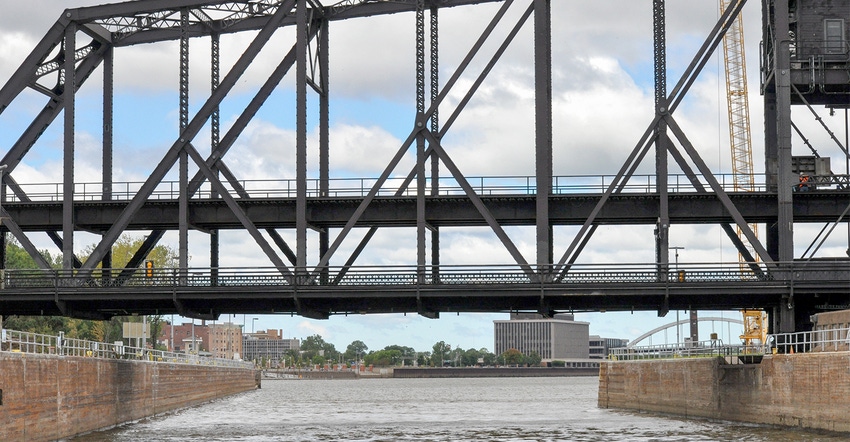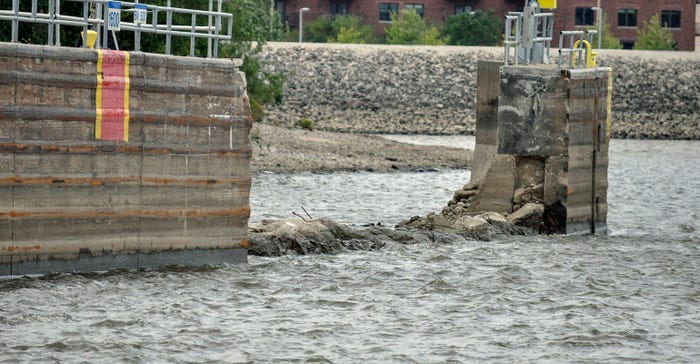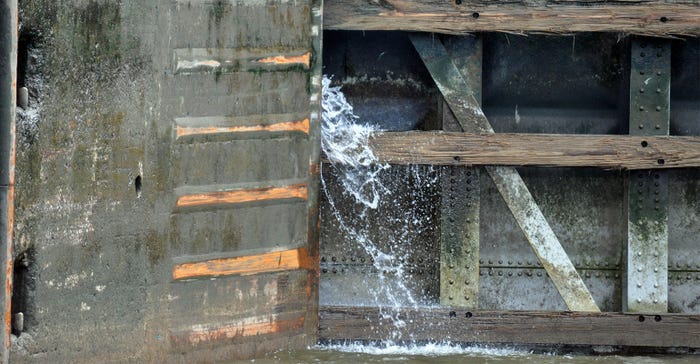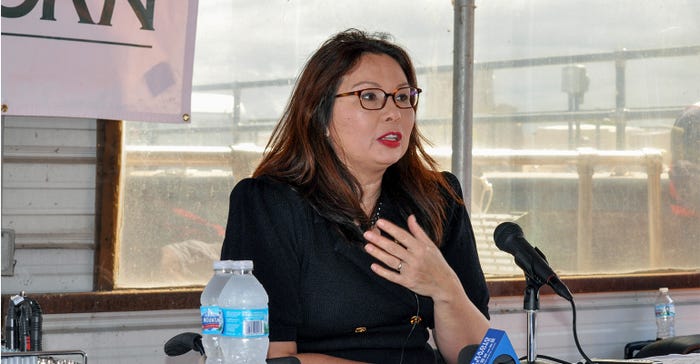
Leaky gates and crumbled concrete made the deteriorating waterway infrastructure obvious during the Illinois and Iowa corn growers associations’ Mississippi River barge tour held in early August. Sen. Tammy Duckworth, D-Ill.; Rep. Dave Loebsack, D-Iowa; Rep. Rod Blum, R-Iowa; and several commodity and industry organization representatives boarded the LJ Sullivan for a firsthand look at Rock Island’s declining Lock and Dam 15.
“The inland waterway has been a silent and neglected transportation system that really needs to be part of any infrastructure package moving forward,” said Paul Rohde, Midwest vice president of the Waterways Council. “With more than 60% of America’s agricultural exports moving on the river system, it’s absolutely crucial for the American economy.”
The inland river system is the most economical, efficient and environmentally friendly mode of transportation, he added, and its neglected infrastructure is in desperate need of updates and repairs.
 CRUMBLING CONCRETE: Tows use guide walls to ease into the locks. The broken wall at Lock and Dam 15 presents major problems. “Those tows are a quarter-mile long, and they don’t stop on a dime,” explains Paul Rohde, Waterways Council. “It’s a critical part of the process.”
CRUMBLING CONCRETE: Tows use guide walls to ease into the locks. The broken wall at Lock and Dam 15 presents major problems. “Those tows are a quarter-mile long, and they don’t stop on a dime,” explains Paul Rohde, Waterways Council. “It’s a critical part of the process.”

“Unfortunately, 80% of the locks will exceed their life expectancy in three years,” Rohde explained. “They [locks and dams] are meant to last 50 years, and most of them were built in the 1930s.” The U.S. Army Corps of Engineers is often forced to shift maintenance funds to unexpected emergency repairs, like the crumbled guide wall at Lock and Dam 15, and leave annual maintenance projects short.
Barge tour attendees locked through Dam 15 and found water pouring out of places it shouldn’t. “Nothing is water-tight anymore,” Rohde said, adding he hopes it doesn’t take a tragedy to spark legislative action.
“We can no longer afford to assume that it’s going to be reliable,” he noted. “We have to invest in this infrastructure.”
Tour takeaways
The barge tour gave Duckworth, who sits on the Environment and Public Works Committee and the Science, Commerce and Transportation Committee, her first lock-through experience and a direct look at the decaying system.
“I look forward to applying what I learned today to my job in Washington,” she noted. “My goal is to support economic development, in everything from Rock Island down to Cairo, and to make sure we have adequate infrastructure.”
 NOT NORMAL: Barge tour attendees locked through Dam 15 and found water pouring out of places it shouldn’t. “Nothing is water-tight anymore,” says Paul Rohde, Waterways Council.
NOT NORMAL: Barge tour attendees locked through Dam 15 and found water pouring out of places it shouldn’t. “Nothing is water-tight anymore,” says Paul Rohde, Waterways Council.

The outdated waterway transportation system is not meeting the demands. Despite full grain bins in the Corn Belt and low commodity prices, Duckworth said the United States imports grain because commodities can’t move down the Mississippi River fast enough to be competitive against countries like Brazil.
“That’s a reflection of our transportation system,” says Tom Mueller, Illinois Corn Growers Association. “East Coast chicken farmers find it’s cheaper to buy corn out of Brazil than out of the Midwest.”
He encouraged fellow farmers to reach out to their legislators and voice their concerns about the much-needed waterway system updates. “It’s great to see the legislators here with us today and engaged in learning what’s happening,” he added.
Duckworth said she already has bipartisan support from Sen. Joni Ernst, R-Iowa, who was unable to attend the tour.
“Bottom line, it’s about time we made serious investments in our nation’s interstate commerce system,” Duckworth said. “I say that specifically — interstate commerce — because it’s not just about the highways, rails and airports; it’s also about the waterways of the United States.”
 FUNDS NEEDED: “Bottom line, it’s about time we made serious investments in our nation’s interstate commerce system,” notes Sen. Tammy Duckworth.
FUNDS NEEDED: “Bottom line, it’s about time we made serious investments in our nation’s interstate commerce system,” notes Sen. Tammy Duckworth.

About the Author(s)
You May Also Like




